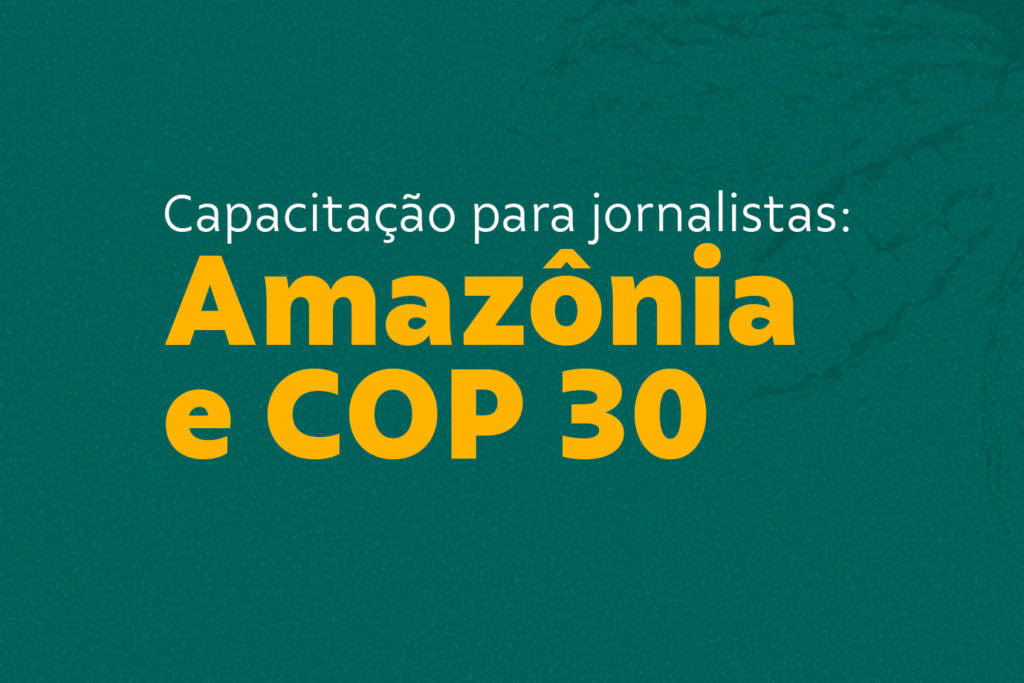Course was held in partnership with the Capital Reset news platform and 96% of participants rated it as “excellent” or “very good”

On December 5, Fundo Vale, in partnership with news platform Capital Reset, held an online training course for journalists called “Stand out at COP30.” The event featured three panel discussions and was attended by 25 journalists. According to the satisfaction survey, the initiative had a high approval rating: 96% of the journalists evaluated the overall quality of the course as “excellent” or “very good,” and 100% said that the content met or exceeded their expectations.
Gustavo Luz, Fundo Vale’s director, gave the opening remarks. He pointed out the need for COP30 to leave a sustainable and cultural legacy for the Amazon region. He expressed the hope that the event will inspire concrete actions to mitigate the climate crisis and promote a positive narrative about Brazil and the Amazon Rainforest.
Luz also highlighted the importance of the Amazon and bioeconomy themes at COP30, stressing the need for journalists to amplify local voices in narratives about the region. “There is nothing better than for communicators to know the region’s agenda in order to tell this story in the best way, based on the legitimacy of those who have been protecting the forest for many years,” he said.
Amazon panel
The first panel, about the Amazon, was moderated by Daniel Nardin, a journalist and founder of Amazônia Vox. Caroline Rocha of the Latin American Climate Lawyers Initiative for Mobilizing Action (La Clima) and Ritaumaria Pereira of the Institute for the Amazon’s People and Environment (Imazon) presented different visions for journalists to reflect on the characteristics and challenges of the Amazon – a biome that is fundamental for regulating the planet’s climate.
Ritaumaria Pereira emphasized the concept of the “Five Amazons,” a classification that guides actions for conservation and sustainable development in the region: the “Forest Amazon,” with preserved areas of rich biodiversity; the “Pressured Amazon,” impacted by crop and livestock farming activities; the “Deforested Amazon,” which requires recovery and reforestation initiatives; the “Non-Forest Amazon,” which includes part of the Cerrado Savanna and faces great pressure for further habitat clearance; and the “Urban Amazon,” where 76% of the region’s people live.
Carolina Rocha, who is also the co-founder of the Amazon Climate Network, addressed Amazonian issues from a local perspective, stressing that historical solutions for the region have often been imposed from outside, without considering local circumstances and needs. She said that the participation of Amazonian experts is essential to understand the dynamics of the region and it is fundamental for development policies and practices to be locally driven, respecting the Amazon’s potential for the bioeconomy and sustainable tourism.
Bioeconomy panel
The second panel, moderated by Vanessa Adachi of Capital Reset, addressed the bioeconomy as a lever for the development and preservation of biomes in Brazil, with a focus on the Amazon.
Márcia Soares, Fundo Vale’s Amazon and partnerships manager, pointed out that deforestation is directly linked to economic issues and highlighted the importance of integrating local communities into bioeconomy initiatives. She explained the need to develop a joint bioeconomy business system, in which scale isn’t only about production by individual businesses, but also relates to the number of businesses that benefit local communities through the equitable distribution of value along the production chain.
“Although there are many initiatives aimed at strengthening the businesses of traditional communities, we are still on a very small scale compared to the potential that the bioeconomy can offer. The challenge is how to scale up the bioeconomy without putting pressure on the forest,” she said.
Mariano Cenamo, co-founder of the Amazon Conservation and Sustainable Development Institute (Idesam) and CEO of the Amazon Impact Accelerator (AMAZ), emphasized the importance of integrating bioeconomy-related science and practices with traditional knowledge, as well as highlighting the need for adequate financial support to guarantee the prosperity and sustainability of these businesses. “Although there has been an abundance of announcements about resources in global forums such as the COP conferences, the effectiveness of applying this capital in the Amazon is limited due to the slowness of the processes and the lack of agile mechanisms for disbursements. We need to invest in an innovative and bold way, taking risks, to generate real results in terms of reducing deforestation and promoting the bioeconomy,” he said.
COP30 panel
The third panel was moderated by Capital Reset journalist Sérgio Teixeira Junior. The speakers were Rodrigo Lima of consulting firm Agroicone and Natália Renteria of Climate Connection.
Lima stressed that COP30 in Brazil must address all climate solutions in an integrated manner. He said that the Brazilian presidency will need extensive negotiating experience to lead effectively and restore confidence in the multilateral process, promoting the implementation of climate actions aligned with financing targets and nationally determined contributions. “A COP is like a soccer match, in which the ball is on the pitch all the time. There are moments of great movement, but we don’t always see big decisions being made,” he said.
Lawyer and climate negotiation expert Natália Renteria gave the participants a practical insight into the organization of COPs. She explained that each conference is structured around a central theme that guides the discussion and that the mobilization of society takes place both inside and outside the event. However, she pointed out that the real influence on the negotiations comes through official channels. According to her, this complex structure is essential to make climate discussions and agreements viable. “COP30 will be crucial for rebuilding trust between countries and making progress in implementing climate action,” she said.
